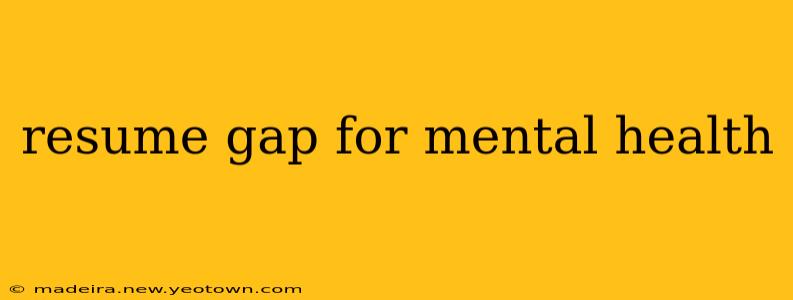Navigating the Resume Gap: Honesty and Strength in Addressing Mental Health
The blank space on your resume can feel like a gaping chasm, a silent judge whispering doubts. But what if that space isn't a flaw, but an opportunity? This article delves into how to address a resume gap caused by mental health challenges, transforming a perceived weakness into a testament to your resilience and strength.
It's a story many share, a silent struggle often hidden behind polished professional facades. Life throws curveballs, and sometimes those curveballs manifest as mental health battles that temporarily disrupt our careers. The key is not to hide this reality, but to address it honestly and strategically on your resume.
How to Address a Resume Gap Due to Mental Health
The most straightforward approach is often the best. You don't have to disclose specific diagnoses; maintaining your privacy is crucial. However, being transparent about a period of time away from work due to personal health reasons demonstrates integrity and self-awareness. Remember, potential employers value honesty and resilience.
Here's how to approach it:
-
Bridge the Gap with a Concise Explanation: Instead of leaving a blank space, use a brief, generalized statement in your resume's employment history. For example: "Focus on personal health and well-being (2022-2023)" or "Period of leave for personal reasons (2021-2022)." Keep it professional and avoid detailed explanations in this section.
-
Highlight Skills Acquired During the Gap: Did you learn new skills during your time away? Did you volunteer, take online courses, or pursue personal projects? This shows initiative and proactive skill development, diverting attention from the gap itself.
-
Focus on Your Strengths and Achievements: Emphasize your accomplishments before and after the gap. Showcase your skills and experience that remain relevant to the job you're seeking. Your resume should tell a story of your career progression, not solely focus on the interruption.
-
Prepare for the Interview: Be prepared to address the gap briefly and confidently during interviews. Frame it as a period of self-reflection and growth. Focus on the positive outcomes, like newfound coping mechanisms, increased self-awareness, or the skills you've developed.
Is it Necessary to Disclose Mental Health Challenges?
This is entirely your decision. Legally, you are not obligated to disclose mental health information to potential employers. However, many find that being upfront builds trust and demonstrates authenticity. Consider your comfort level and the context of the job application. If you choose to disclose, keep it concise and professional.
What if a Potential Employer Asks Directly?
If the topic comes up, handle it with grace and professionalism. A simple response such as, "I experienced a period of personal health challenges, but I'm now feeling well and ready to contribute my skills to your team" is sufficient. Remember, your focus should remain on your abilities and future contributions.
Addressing Potential Concerns: Skills and Experience During the Gap
-
What if I didn't work during that time? Emphasize any volunteer work, personal projects, or skill development initiatives you undertook. Even small projects demonstrate that you actively used your time productively.
-
How do I account for a significant gap? A longer gap can be addressed more extensively in your cover letter, providing a more detailed yet concise narrative.
-
How can I show my resilience? Use action verbs in your resume and cover letter to highlight your drive and determination. For instance, "overcame challenges," "successfully adapted," or "demonstrated resilience."
Remember, your mental health journey is a testament to your strength and resilience. Framing your experience in a positive light, highlighting your skills and accomplishments, and preparing for potential questions empowers you to confidently navigate the resume gap and pursue your career goals. You are not alone, and your story of perseverance is valuable.

